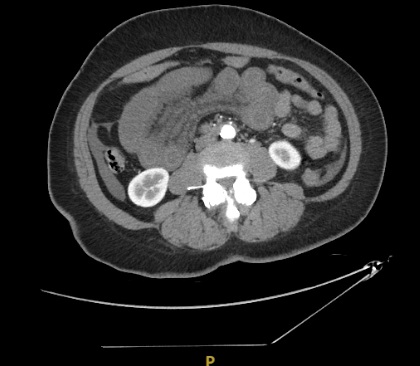Monday Poster Session
Category: Small Intestine
P3270 - Beyond Dry Eyes: Sjogren's Syndrome and A Case of Hidden Abdominal Adhesions
Monday, October 28, 2024
10:30 AM - 4:00 PM ET
Location: Exhibit Hall E
- MA
Mohammed Akram, MD
HCA Aventura Hospital
Aventura, FL
Presenting Author(s)
Mohammed Akram, MD1, Luis Zayas, MD2, Mahesh Tummala, DO1, Aya Akhras, MD2, Saadia Nabi, MD2, Carmen Tormo, MD1, Kristen Santana, MD2
1HCA Aventura Hospital, Aventura, FL; 2Aventura Hospital, Aventura, FL
Introduction: Sjogren’s Syndrome (SS) is an autoimmune disease affecting exocrine glands, primarily impacting oral and ocular secretions. SS can affect any part of the gastrointestinal (GI) tract, with about 25% of patients experiencing abdominal disorders but there is a lack of documented literature. Post-surgical abdominal adhesions are common, but inflammatory and congenital adhesions are rarely symptomatic. This case study explores whether SS can cause bowel adhesions, presenting a patient with SS and intestinal adhesions without prior surgery or other chronic inflammatory diseases.
Case Description/Methods: A 62 year old female with a past medical history of type 2 diabetes and SS presented to the hospital due to severe acute abdominal pain. The abdomen was soft, non-distended with active bowel sounds and tenderness to palpation in the right lower quadrant. No guarding, rigidity, or peritoneal signs were present. Labs on admission showed Lactic acidosis and evidence of DKA. Immunologic workup was positive for antibodies for SS. A CT Angiography of the Abdomen/Pelvis showed circumferential thickening, edema and inflammation the small bowel. The patient was given fluids, antibiotics and was monitored in the ICU. Overnight they became tachycardic, hypotensive, developed peritoneal signs, and underwent an exploratory laparotomy. Ischemic small intestine was noted and adhesions were present at the base of the mesentery of the affected small intestine. Biopsies taken were positive only for fibrous tissue with acute and chronic inflammation.
Discussion: The pathophysiology of SS is a combination of environmental triggers (viral infections), chronic immune activation, and a vicious cycle of autoimmunity in a host with genetic susceptibility. Since SS affects exocrine glands, it can affect any part of the GI tract. 25% of patients have extra glandular involvement commonly as atrophic gastritis, esophageal webs, and autoimmune pancreatitis. Our clinical case was unique, as our patient had intestinal adhesions and bowel ischemia likely due to SS. A thorough literature search showed onluy one prior case report has linked SS with intestinal adhesions. SS may be linked to adhesion formation due to its association with scleroderma, a disease characterized by increased fibroblast adhesion and collagen deposition. While elevated TNFα and cytokines in SS and its correlation with adhesions in other conditions suggest a potential link, further investigation is needed to elucidate the exact mechanism in SS pathogenesis.

Disclosures:
Mohammed Akram, MD1, Luis Zayas, MD2, Mahesh Tummala, DO1, Aya Akhras, MD2, Saadia Nabi, MD2, Carmen Tormo, MD1, Kristen Santana, MD2. P3270 - Beyond Dry Eyes: Sjogren's Syndrome and A Case of Hidden Abdominal Adhesions, ACG 2024 Annual Scientific Meeting Abstracts. Philadelphia, PA: American College of Gastroenterology.
1HCA Aventura Hospital, Aventura, FL; 2Aventura Hospital, Aventura, FL
Introduction: Sjogren’s Syndrome (SS) is an autoimmune disease affecting exocrine glands, primarily impacting oral and ocular secretions. SS can affect any part of the gastrointestinal (GI) tract, with about 25% of patients experiencing abdominal disorders but there is a lack of documented literature. Post-surgical abdominal adhesions are common, but inflammatory and congenital adhesions are rarely symptomatic. This case study explores whether SS can cause bowel adhesions, presenting a patient with SS and intestinal adhesions without prior surgery or other chronic inflammatory diseases.
Case Description/Methods: A 62 year old female with a past medical history of type 2 diabetes and SS presented to the hospital due to severe acute abdominal pain. The abdomen was soft, non-distended with active bowel sounds and tenderness to palpation in the right lower quadrant. No guarding, rigidity, or peritoneal signs were present. Labs on admission showed Lactic acidosis and evidence of DKA. Immunologic workup was positive for antibodies for SS. A CT Angiography of the Abdomen/Pelvis showed circumferential thickening, edema and inflammation the small bowel. The patient was given fluids, antibiotics and was monitored in the ICU. Overnight they became tachycardic, hypotensive, developed peritoneal signs, and underwent an exploratory laparotomy. Ischemic small intestine was noted and adhesions were present at the base of the mesentery of the affected small intestine. Biopsies taken were positive only for fibrous tissue with acute and chronic inflammation.
Discussion: The pathophysiology of SS is a combination of environmental triggers (viral infections), chronic immune activation, and a vicious cycle of autoimmunity in a host with genetic susceptibility. Since SS affects exocrine glands, it can affect any part of the GI tract. 25% of patients have extra glandular involvement commonly as atrophic gastritis, esophageal webs, and autoimmune pancreatitis. Our clinical case was unique, as our patient had intestinal adhesions and bowel ischemia likely due to SS. A thorough literature search showed onluy one prior case report has linked SS with intestinal adhesions. SS may be linked to adhesion formation due to its association with scleroderma, a disease characterized by increased fibroblast adhesion and collagen deposition. While elevated TNFα and cytokines in SS and its correlation with adhesions in other conditions suggest a potential link, further investigation is needed to elucidate the exact mechanism in SS pathogenesis.

Figure: Inflammatory changes seen in the small bowel
Disclosures:
Mohammed Akram indicated no relevant financial relationships.
Luis Zayas indicated no relevant financial relationships.
Mahesh Tummala indicated no relevant financial relationships.
Aya Akhras indicated no relevant financial relationships.
Saadia Nabi indicated no relevant financial relationships.
Carmen Tormo indicated no relevant financial relationships.
Kristen Santana indicated no relevant financial relationships.
Mohammed Akram, MD1, Luis Zayas, MD2, Mahesh Tummala, DO1, Aya Akhras, MD2, Saadia Nabi, MD2, Carmen Tormo, MD1, Kristen Santana, MD2. P3270 - Beyond Dry Eyes: Sjogren's Syndrome and A Case of Hidden Abdominal Adhesions, ACG 2024 Annual Scientific Meeting Abstracts. Philadelphia, PA: American College of Gastroenterology.
